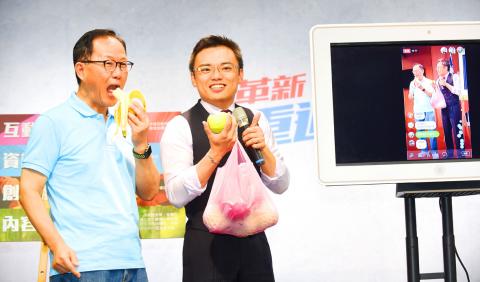The Chinese Nationalist Party (KMT) yesterday launched a Web site for the party’s candidates in November’s nine-in-one local elections that allows the public to make donations and access election-related information.
The Web site (https://kmt2018.com/index.asp) has pages dedicated to each KMT candidate at every level of the local elections where visitors can read about the candidate’s credentials, achievements, campaign slogans and policy platform.
The pages also contain information about the candidates’ bank accounts dedicated to donations, as well as links to their social network pages.

Photo: Liu Hsin-de, Taipei Times
“There are nearly 1,000 candidates in the nine-in-one elections and each candidate has their own campaign policies,” KMT Culture and Communications Committee deputy director-general Hung Meng-kai (洪孟楷) said.
“That is why we built this Web site to put all the information on one platform, so that voters can easily access them and make a sound decision at the ballot box,” Hung said, adding that the candidates provided the content about themselves for the Web site.
The home page includes a widget that allows visitors to monitor the weather condition, the PM2.5 level — fine particulate matter measuring 2.5 micrometers or smaller — and the power supply level for the city or county they live in, Hung added.
The information corresponds with the KMT’s referendum proposals against air pollution and a plan to build a coal-fired plant on the site of the old Shenao Power Plant (深澳電廠) in New Taipei City, Hung said.
KMT Taipei mayoral candidate Ting Shou-chung (丁守中) said the candidates are grateful to the KMT headquarters for building the Web site, despite limited funds.
“The local elections are overshadowed by unequal resources. The Democratic Progressive Party has the advantage of being the ruling party and has access to the central government’s colossal budgets,” Ting said.
“There is no way we can compete with that,” he said.

The first global hotel Keys Selection by the Michelin Guide includes four hotels in Taiwan, Michelin announced yesterday. All four received the “Michelin One Key,” indicating guests are to experience a “very special stay” at any of the locations as the establishments are “a true gem with personality. Service always goes the extra mile, and the hotel provides much more than others in its price range.” Of the four hotels, three are located in Taipei and one in Taichung. In Taipei, the One Key accolades were awarded to the Capella Taipei, Kimpton Da An Taipei and Mandarin Oriental Taipei. Capella Taipei was described by

EVA Airways today confirmed the death of a flight attendant on Saturday upon their return to Taiwan and said an internal investigation has been launched, as criticism mounted over a social media post accusing the airline of failing to offer sufficient employee protections. According to the post, the flight attendant complained of feeling sick on board a flight, but was unable to take sick leave or access medical care. The crew member allegedly did not receive assistance from the chief purser, who failed to heed their requests for medical attention or call an ambulance once the flight landed, the post said. As sick

Minister of Economic Affairs Kung Ming-hsin (龔明鑫) yesterday said that private-sector refiners are willing to stop buying Russian naphtha should the EU ask them to, after a group of non-governmental organizations, including the Centre for Research on Energy and Clean Air (CREA), criticized the nation’s continued business with the country. While Taiwan joined the US and its Western allies in putting broad sanctions on Russia after it invaded Ukraine in 2022, it did not explicitly ban imports of naphtha, a major hard-currency earner for Russia. While state-owned firms stopped importing Russian oil in 2023, there is no restriction on private companies to

INDUSTRY: Beijing’s latest export measures go beyond targeting the US and would likely affect any country that uses Chinese rare earths or related tech, an academic said Taiwanese industries could face significant disruption from China’s newly tightened export controls on rare earth elements, as much of Taiwan’s supply indirectly depends on Chinese materials processed in Japan, a local expert said yesterday. Kristy Hsu (徐遵慈), director of the Taiwan ASEAN Studies Center at the Chung-Hua Institution for Economic Research, said that China’s latest export measures go far beyond targeting the US and would likely affect any country that uses Chinese rare earths or related technologies. With Japan and Southeast Asian countries among those expected to be hit, Taiwan could feel the impact through its reliance on Japanese-made semi-finished products and